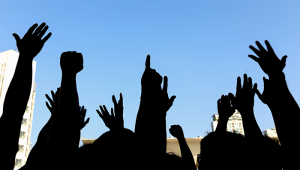Demonstrators scaled the historic buildings of the Champs-Elysées and the Arc de Triomphe in the capital Paris over the weekend as the riots escalated.
President Emmanuel Macron went straight to see the damage after arriving back in Paris on Sunday from the G20 summit in Argentina.
He ordered his prime minister Edouard Philippe to meet with protest groups and oppositions parties this week. The president and Philippe also met on Sunday.
There has been some speculation the government would impose a state of emergency, although junior interior minister Laurent Nunez said “for now it’s not on the table”.
Police said three people have died since the unrest started about two weeks ago, initially over planned hikes to fuel tax set to kick in on 1 January next year.
It is expected tax on diesel will increase by 6.5 cents per litre and tax on petrol will increase by 2.9 cents.
A French government briefing on the Finance Bill, which was presented to ministers in September, acknowledged that fuel tax rises might not be popular but were the right course of action “in a country that sees 48,000 premature deaths a year connected with air pollution”.
The briefing added: “Taxes cannot do it all … but they help put us on the right path.”
The riots – led by masked protesters called gilets jaunes or ‘yellow jackets’ – started out as a protest against the fuel hikes, but have since also become about rising prices in France and growing dissatisfaction with Macron himself.
Motorists were already unhappy with the cost of diesel, the most commonly used fuel in French cars, having risen by about 23% in the last year. It is the highest price for diesel in France since the early 2000s.







